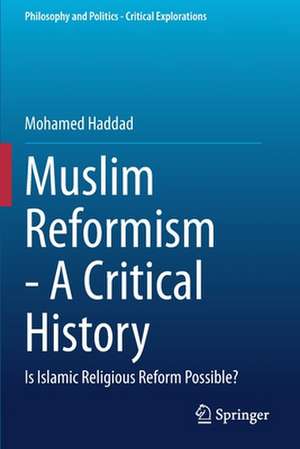Muslim Reformism - A Critical History: Is Islamic Religious Reform Possible?: Philosophy and Politics - Critical Explorations, cartea 11
Autor Mohamed Haddaden Limba Engleză Paperback – 28 feb 2021
| Toate formatele și edițiile | Preț | Express |
|---|---|---|
| Paperback (1) | 381.43 lei 43-57 zile | |
| Springer International Publishing – 28 feb 2021 | 381.43 lei 43-57 zile | |
| Hardback (1) | 388.72 lei 43-57 zile | |
| Springer International Publishing – 29 feb 2020 | 388.72 lei 43-57 zile |
Din seria Philosophy and Politics - Critical Explorations
-
 Preț: 226.46 lei
Preț: 226.46 lei - 20%
 Preț: 567.63 lei
Preț: 567.63 lei - 24%
 Preț: 633.27 lei
Preț: 633.27 lei -
 Preț: 394.29 lei
Preț: 394.29 lei - 15%
 Preț: 635.12 lei
Preț: 635.12 lei - 15%
 Preț: 580.17 lei
Preț: 580.17 lei -
 Preț: 384.31 lei
Preț: 384.31 lei - 18%
 Preț: 900.49 lei
Preț: 900.49 lei - 18%
 Preț: 725.92 lei
Preț: 725.92 lei - 15%
 Preț: 466.95 lei
Preț: 466.95 lei - 18%
 Preț: 728.43 lei
Preț: 728.43 lei - 15%
 Preț: 634.68 lei
Preț: 634.68 lei - 15%
 Preț: 707.78 lei
Preț: 707.78 lei - 15%
 Preț: 690.76 lei
Preț: 690.76 lei - 18%
 Preț: 723.06 lei
Preț: 723.06 lei - 18%
 Preț: 721.51 lei
Preț: 721.51 lei - 18%
 Preț: 726.55 lei
Preț: 726.55 lei -
 Preț: 369.56 lei
Preț: 369.56 lei - 18%
 Preț: 895.76 lei
Preț: 895.76 lei - 15%
 Preț: 696.35 lei
Preț: 696.35 lei - 15%
 Preț: 701.90 lei
Preț: 701.90 lei - 15%
 Preț: 642.83 lei
Preț: 642.83 lei - 15%
 Preț: 648.24 lei
Preț: 648.24 lei - 20%
 Preț: 566.51 lei
Preț: 566.51 lei - 15%
 Preț: 585.73 lei
Preț: 585.73 lei - 15%
 Preț: 642.18 lei
Preț: 642.18 lei - 18%
 Preț: 731.73 lei
Preț: 731.73 lei -
 Preț: 390.25 lei
Preț: 390.25 lei
Preț: 381.43 lei
Nou
Puncte Express: 572
Preț estimativ în valută:
72.99€ • 76.40$ • 60.75£
72.99€ • 76.40$ • 60.75£
Carte tipărită la comandă
Livrare economică 31 martie-14 aprilie
Preluare comenzi: 021 569.72.76
Specificații
ISBN-13: 9783030367763
ISBN-10: 3030367762
Pagini: 168
Ilustrații: IX, 168 p. 5 illus.
Dimensiuni: 155 x 235 mm
Greutate: 0.26 kg
Ediția:1st ed. 2020
Editura: Springer International Publishing
Colecția Springer
Seria Philosophy and Politics - Critical Explorations
Locul publicării:Cham, Switzerland
ISBN-10: 3030367762
Pagini: 168
Ilustrații: IX, 168 p. 5 illus.
Dimensiuni: 155 x 235 mm
Greutate: 0.26 kg
Ediția:1st ed. 2020
Editura: Springer International Publishing
Colecția Springer
Seria Philosophy and Politics - Critical Explorations
Locul publicării:Cham, Switzerland
Cuprins
Chapter 1. Introduction: The Missing Reform.- Part I: Classical Reformism: The Birth and Decline of a Paradigm.- Chapter 2. A Muslim Reformist: Muhammad Abduh.- Chapter 3. The Paradigm of Reform.- Part II: Perspectives for Today’s Islam.- Chapter 4. What is Left of Classical Reformism?.- Chapter 5. New Tracks.- Chapter 6 Epilogue: What Reforms for Today?.- Chapter 7. Postscript: “When Islam Awakens: Problematizing the idea of Reformation (Islah)”.
Notă biografică
Mohamed HADDAD is a Professor at the University of Carthage. Islamologue and Holder of PhD from the University of Sorbonne. Major specialist in Reformist Islam, author and translator of more than twenty books, engaged agent in the inter-religious dialogue.
Textul de pe ultima copertă
This book examines the evolution of Islam in our modern world. The renowned Tunisian scholar Mohamed Haddad traces the history of the reformist movement and explains recent events related to the Islamic religion in Muslim countries and among Muslim minorities across the world. In scholarly terms, he evaluates the benefits and drawbacks of theological-political renovation, neo-reformism, legal reformism, mystical reformism, radical criticism, comprehensive history and new approaches within the study of Islam. The book brings to life the various historical, sociological, political and theological challenges and debates that have divided Muslims since the 19th century. The first two chapters address failed reforms in the past and introduce the reader to classical reformism and to Mohammed Abduh. Haddad ultimately proposes a non-confessional definition of religious reform, reinterpreting and adjusting a religious tradition to modern requirements. The second part of the book explores perspectives on contemporary Islam, the legacy of classical reformism and new paths forward. It suggests that the fundamentalism embodied in Wahhabism and Muslim Brotherhood has failed. Traditional Islam no longer attracts either youth or the elites. Mohamed Haddad shows how this paves the way for a new reformist departure that synthesizes modernism and core Islamic values.
Caracteristici
Only book covering the history of reformist Islam and dealing with a possibility of Islamic modernisation Explains the reasons why a reform in Islam became increasingly urgent after Arab Revolutions Introduces the history of religious reform in Islam that took place from the 12th to the 20th century
